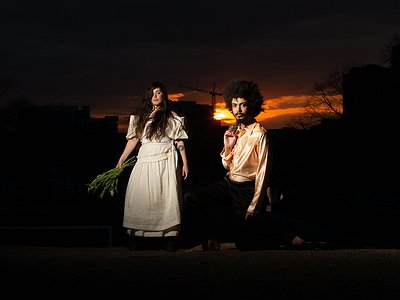Part 1
Names: Yves Jarvis and Romy Lightman
Nationality: Canadian
Occupation: musicians
Current Release: Banned on ANTI-
Recommendation: “Sink In” by Tirzah /“Over the Edge” by Wipers
If you enjoyed this interview with Yves Jarvis and Romy Lightman they have a bandcamp page
When did you start writing/producing music - and what or who were your early passions and influences? What was it about music and/or sound that drew you to it?
Jarvis: I have been involved in music my entire life. I am mystified by its ephemeral might.
Lightman: I started writing songs once the questioning began. I came up in a fairly traditional community where girls weren’t really encouraged to play in bands or partake in the nightly jam basement sessions so my sister and I really had to invent our own musical road.
For most artists, originality is preceded by a phase of learning and, often, emulating others. What was this like for you: How would you describe your own development as an artist and the transition towards your own voice?
L: I was always a big reader growing up, so when I first began writing songs I often riffed with the voice of the poets and all my old literary friends until I was able to devour enough slices of my own life.
J: I had to emulate everyone before feeling properly calibrated to authentically express myself creatively. It took 5 years of daily recording to scratch any kind of self-determined itch. My musical understanding was largely developed by identifying the mechanics of song craft and production through multitrack recording.
How do you feel your sense of identity influences your creativity?
L: I've always identified with artists since I was a child; I studied both art and philosophy so conceptualism and expressionism are always integrated in my work. I am chasing curiosity beyond theory.
J: My work is me: contradiction.
What were your main creative challenges in the beginning and how have they changed over time?
L: I had to learn how to really be in the world with a body rather than floating energy eagerly attempting to return to the divine mind. Turning slightly away from more esoteric understanding and allowing myself to inhabit more corporeal structures; eating breakfast and going for walks, working with what’s around you rather then daydreaming elsewhere.
J: I'm used to working alone in every aspect. I need to have my hands on every level of projection and representation, so sharing the space and genuinely seeding ground is odd but fulfilling. It only works on a basis of mutual compersion. It’s not an easily accessible state outside of the bonds of Love.
As creative goals and technical abilities change, so does the need for different tools of expression, be it instruments, software tools or recording equipment. Can you describe this path for you, starting from your first studio/first instrument? What motivated some of the choices you made in terms of instruments/tools/equipment over the years? Have there been technologies or instruments which have profoundly changed or even questioned the way you make music?
L: I think the voice is the greatest technology we have. Working with the voice through breath work and deep listening to become a more accessible emoter is something that’s really helped.
J: Audio recording is among the most transcendent technological marvels of all time. Specifically, the invention of multitrack home recording will never cease to bewilder me. I thank God that I’m alive in such an age.
Collaborations can take on many forms. What role do they play in your approach and what are your preferred ways of engaging with other creatives through, for example, file sharing, jamming or just talking about ideas?
L: Collaborations are a great way to practise symbiosis; connecting to a shared fluid purpose feels crucial to generating something that’s greater than the sum of its parts. Ecstatic Band is a project guided by this very distant musing
J: Funnelling all of one's attention into moments, jams, that's where we are able to grow and flex existing muscle. That external connection feeds and informs the inner world to no end.





